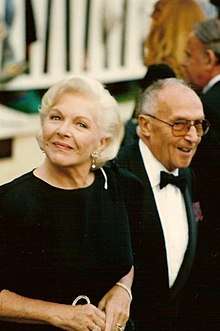Line Renaud
Line Renaud (born 2 July 1928) is a French singer, actress and AIDS activist.
Line Renaud | |
|---|---|
 Line Renaud at the 2011 NRJ Music Awards | |
| Born | Jacqueline Ente 2 July 1928 |
| Nationality | French |
| Occupation | Singer, Actress |
| Years active | 1945–present |
| Spouse(s) | Loulou Gasté (1950–1995, his death) |
Early life
Line Renaud was born Jacqueline Ente in Pont-de-Nieppe on 2 July 1928. Her mother Simone was a shorthand typist; her father was a truck driver during the week, but he played the trumpet on weekends, in a local brass band. Line showed the first signs of her talent in primary school, when at the age of seven she won an amateur competition.
During the Second World War, Jacqueline's father was mobilised, spending five years away from the family. During this time, Jacqueline was brought up by her mother, grandmother and great-grandmother. Her grandmother had a café in Armentières, where she used to sing for passing soldiers.
Early career and meeting Loulou Gasté
She auditioned at Conservatoire de Lille, singing songs written by Loulou Gasté "Sainte-Madeleine" and "Mon âme au diable". Louis Gasté was at that time a well-known French composer. At the end of the audition, she was approached by the director of Radio Lille who was looking for a singer. She took the pseudonym of Jacqueline Ray and joined the station singing a repertoire based on the songs by Loulou Gasté. In 1945, she moved to Paris and got her first gig in Folies Belleville, where she was introduced to Gasté. She was 16, and Gasté was 37. He became her mentor, changing her image and her name.
Music career

Line Renaud made her national debut on Radio Luxembourg, singing on a Sunday morning program. After signing a contract with Pathe Marconi, she recorded "Ma Cabane au Canada", written by Loulou Gasté, which won le Grand Prix du Disque. She also sang with Yves Montand in the Théâtre de l'Etoile. She toured Europe and Africa extensively, came back to Paris to star at the ABC, and recorded numerous adaptations of American songs such as "Ma petite folie", "Etoile des neiges" and "Le chien dans la vitrine".
In 1954, while performing at Moulin Rouge, she met Bob Hope and subsequently appeared in five episodes of The Bob Hope Show in the US. During this trip, she also sang in the Waldorf Astoria (New York) and the Cocoanut Grove (Los Angeles), appeared on Johnny Carson, Dinah Shore and Ed Sullivan shows and recorded with Dean Martin the song ‘Relax ay voo’.
In 1959, she started a four-year run of ‘Plaisir de Paris’ for Henri Varna and then went on to perform in a Las Vegas show at Dunes from 1963 to 1965. In 1966 she returned to Paris and the Casino de Paris starring in a new show, Desir de Paris. In 1968, she returned to Las Vegas for a number of performances. In France, in 1973 she created an American show which she toured for two years around the country. She then helped Casino de Paris, threatened by closing, by putting on a show called ‘Paris – Line’ with Loulou Gasté, which ran for four years.
In the 1980s, she starred in a TV show Telle est Line for Antenne 2 and recorded songs in English and French. At Casino de Paris, she put on a one off show which retraced her forty-year career. Also, in 1981, she served as an unofficial on-air "guide" for Merv Griffin when he taped "The Merv Griffin Show" in Paris, and in 1982 she was a guest on Perry Como's Christmas special in Paris. In 1989, she toured around Japan as part of a festival which marked the bicentennial of the French Revolution.
In March 2019, Renaud was hospitalized due to a fall in her garden.[1].
Film (selected)
- 1951 – Ils sont dans les vignes (Robert Vernay)
- 1952 – Paris Still Sings (Pierre Montazel; music by Loulou Gasté)
- 1953 – La route du bonheur (Maurice Labro)
- 1953 - Boum sur Paris (Maurice de Canonge)
- 1955 – La Madelon (she won Prix du Prestige de la France)
- 1956 – Mademoiselle et son gang (Jean Boyer; music written by Loulou Gasté)
- 1958 – L'Increvable and Mademoiselle et son flirt (Jean Boyer)
- 1988 – Marriage of Figaro (Roger Coggio)
- 1990 – Ripoux contre Ripoux (Claude Zidi)
- 1994 – J’ai pas sommeil (Claire Denis)
- 1995 – Sixieme classique (Bernard Stora)
- 1995 – Ma femme me quitte (Didier Kaminka)
- 1998 – Louise et les marchés (Marc Rivière)
- 1999 – Belle maman (Gabriel Aghion)
- 2001 – Chaos (Coline Serreau)
- 2003 – 18 ans après (Coline Serreau)
- 2003 - Suzie Berton (Bernard Stora)
- 2004 – Le Miroir de l'eau (Edwin Baily)
- 2004 – Menteur ! Menteuse ! (Henry Helman)
- 2005 – Le Courage d'aimer (Claude Lelouch)
- 2005 – Les Sœurs Robin
- 2005 – Les Rois maudits (Josée Dayan)
- 2006 – La Maison du Bonheur (Dany Boon)
- 2008 – Bienvenue chez les Ch'tis (Dany Boon)
- 2008 – Le Silence de l'Epervier (Dominique Ladoge)
- 2010 – Isabelle disparue (Bernard Stora)
- 2011 – La croisière (Pascale Pouzadoux)
- 2015 – Call My Agent! (Antoine Garceau)
- 2019 – Huguette (Antoine Garceau)
Theatre
- 1981 – Folle Amanda (Pierre Barillet and Jean-Pierre Gredy)
- 1986 – The Incomparable Loulou (Charles Nelson-Reilly) English version of Folle Amanda, played in the US
- 1991 – Pleins Feux (Didier Kaminka)
- 1995 – La visite de la vieille dame (Friedrich Dürrenmatt)
- 2002 – Poste restante (Noël Coward)
- 2007 – Fugueuses (Pierre Palmade, Christophe Duthuron)
Personal life
In 1950, she married Loulou Gasté and stayed with him until his death in 1995. In 2000, a Golden Palm Star on the Palm Springs, Walk of Stars was dedicated to her.[2]
AIDS activism
In 1985, she created l'Association des Artistes Contre le Sida and organised televised art events which enabled her to raise funds for helping AIDS scientific research in France.
In 2009, as Vice-President of Sidaction, she condemned the statements of Pope Benedict XVI, who claimed condoms promoted behavior which causes AIDS.[3]
References
- https://www.msn.com/fr-ch/actualite/other/line-renaud-hospitalisée/ar-BBVVwak?ocid=spartanntp
- Palm Springs Walk of Stars by date dedicated Archived 2012-10-13 at the Wayback Machine
- Le pape continue de choquer, leparisien.fr; accessed 14 September 2014.